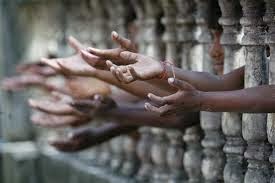CIA Torture Report
Revelations
of torture practiced by the CIA have set off a number of passionate
debates.
There
are some CIA employees who, when asked to torture prisoners, refused
and left the agency. Their reason: “America does not torture.”
Wish it were true! We do not have to go back to times of slavery but
only pay attention to what happens in our prisons today, to know that
that boast is empty. America does torture.
A more interesting debate goes back
and forth about the efficacy of torture. Opponents assert that the
information gained from torture is completely unreliable. The current
and previous heads of the agency insist that torture yielded
information which actually saved lives by preventing other terrorist
attacks. Unfortunately the information on which such claims rest is
classified and we have to just trust them.
This debate is interesting for its
background. It only makes sense to argue about the effectiveness of
torture if you are willing to say that torture that prevents other
terrorist incidents is justified. If you believe that America ought
not to torture—whatever the outcome -- it is pointless to argue
about the actual results of torture. If torture is morally wrong and
you will not sacrifice morality for security, the question of
outcomes is irrelevant.
Here
some readers will chime in and say something like “The ends do not
justify the means.” But that only serves to muddy the waters. In
all sorts of situations, we
believe that the end does justify the means. Many people believe in
the death penalty. We
are willing to kill people for
the sake of closure for the victim's family or for the sake of
discouraging people from committing horrible crimes. Everyone is
willing to have a life saving operation however painful. Many women
are willing to go through the excruciating pain of natural childbirth
for the sake of having
a healthy baby.
In many situations we do believe
that the end justified the means. Does national security justify
torturing suspects?
In
the conduct of foreign policy, not only the CIA, but the US
government,
as a whole, is completely unscrupulous. Here is a chilling example I
came across recently.
The
Ebola epidemic in Liberia got as bad as it is because the early
warnings by the Liberian government were not heeded by the
population. The Liberian government is widely distrusted by the
population, not only for being massively corrupt, but even more
because the President, Ellen Sirleaf, was involved with the different
dictatorial regimes that wreaked havoc in Liberia in the 1980s and
1990s. These military insurgencies were sponsored and supported by
the CIA because the Liberian government of the 1970s was thought to
lean to the left and was therefore not acceptable to us. So the CIA
unleashed a civil war that killed thousands, drove many more from
their homes into exile in neighboring countries, and destroyed the
political structure of the country. One long term effect is that the
government is so unpopular that many Liberians believe that the Ebola
epidemic was the work of the government.
Moral
scruples do not inhibit our government.
Since we constantly present
ourselves as humane, freedom loving, morally punctilious people, our
actual behavior is hypocritical.
The
blatant immorality of our foreign policy makes us fiercely hated and
often ridiculed.
It makes us ever less safe as it inspires fanatical hatred of the US
and motivates more and more people to set out to hurt us.
Worse, we act as unscrupulously and
morally reprehensibly as the worst of our enemies. For the sake of
what we—often mistakenly—believe to be our interest we are
willing to bring down the scourges of totalitarian regimes, civil
war, massive killing and displacement of populations. We are
indifferent to the suffering we impose on millions of people all
around the globe.
Is there any doubt that that is
completely unacceptable?
Here is a good resolution for the
New Year: Congress must defund the CIA.




